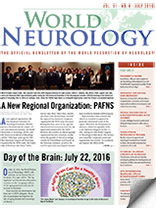By Prisca-Rolande Bassolé, MD, and Yannick Fogang Fogoum, MD

Prisca-Rolande Bassolé, MD, Burkina Faso
Africa is, in terms of population, the second most populous continent in the world, and one on which high population and economic growth forecasts are announced. For a long time, health resources in general and neurological care remained very limited. Fortunately, in the last 50 years, the number of neurologists has increased by more than 30, while the population has increased three times in sub-Saharan Africa. This has occurred simultaneously with economic growth in most countries in the region.1 This improvement in the socio-economic situation has been accompanied by increased investment in the health sector. It was marked by the opening of specialized medical training in neurology in several countries, as well as the establishment of hospitals and addition of equipment, including EEG, EMG, and neuroimaging.1 These advances are beneficial and require one organization and coordination at the regional level in order to achieve an integration of African neurology. These needs have coincided with those of the World Federation of Neurology (WFN) to assist in the establishment of Neurology Academies in different regions of the world, and, in this context, the African Academy of Neurology (AFAN) was born.

Yannick Fogang Fogoum, MD, Cameroon
So, on August 29 and 30, 2015, the inauguration meeting for the creation of AFAN took place in Dakar, Senegal. Several organizations and African countries were represented: South Africa, Benin, Burkina Faso, Cameroon, Congo Brazzaville, Ivory Coast, Congo RDC, Egypt, Ethiopia, Gabon, Ghana, Guinea, Kenya, Madagascar, Mali, Morocco, Mauritania, Niger, Nigeria, Rwanda, Senegal, Sudan, Tanzania, Togo, Tunisia, Uganda, Zambia, France/PAANS, Ivory Coast/PAANS, and Burkina Faso/PAANS.
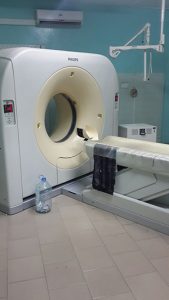
CT scan room of the neurology department at Fann Teaching Hospital, Dakar, Senegal.
AFAN’s mission is to represent and unite African neurologists and provide optimal education, taking into account the advances in neuroscience.2 To meet his challenge, various opinions were sought, including those of young African neurologists.
We want to thank all our professors especially Task and Advisory Force for Africa (TAFNA) Trustee, Professor Amadou Gallo, DIOP, MD, and AFAN President Mouhamadou Mansour Ndiaye, who allowed two young African neurologists, one from Burkina Faso and the other one from Cameroon, the opportunity to identify and summarize, through a brief oral communication, the expectations of the young African neurologists’ generation to which they belong.
To start our presentation, it seemed important to us to specify major challenges, which AFAN will have to raise. It will be:
- Improve neurology training standards.
- Develop a core curriculum for neurology training in African countries.
- Enhance regional and international cooperation.
- Establish an AFAN certification Board.
- Enhance professional development of young neurologists.
- Encourage research and establish guidelines for a better neurological practice in our setting.
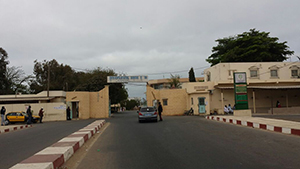
CT scan room of the neurology department at Fann Teaching Hospital, Dakar, Senegal.
To achieve these objectives, AFAN has to place trust in the distal educational level of learning centers. Advantages of those centers, among others, are the existence of human resources that offer quality training and the ability to get external visiting professors during the neurology training. AFAN can also rely on facilities, although deficient in number, namely training centers (teaching hospitals) and equipment (MRI, CT, EEG, EMG, and evoked potentials). Finally, AFAN will be able to make easier the access to various training opportunities (including traineeship, congresses, and regional courses) in collaboration with other societies and organizations (WFN, the International Brain Research Organization, the Pan African Association of Neurological Sciences, the European Academy of Neurology, and the American Academy of Neurology. This will be of great help for the education of young neurologists. While welcoming the efforts already made to the efficiency of training, young African neurologists have high expectations about the creation of this AFAN.
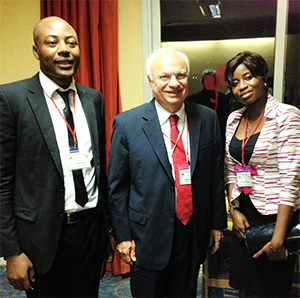
Neurologist Yannick Fogang Fogoum, MD, Cameroon (left), and Prisca-Rolande Bassolé, MD, Burkina Faso (right), meet with WFN President Raad Shakir, MD, to discuss the African Academy of Neurology.
These concern several points:
- Specialized training in neurology with a unique core curriculum for all training centers in Africa (consider regional mobility of neurology trainees), the development of telemedicine and e-learning, and assistance to establish an association of trainees and young African neurologists. AFAN will also have to participate in training by allocation of scholarships, help to create a neurology textbook for Africa, as well as support the creation of sub-specialty training centers.
- EEG room of the neurology department at Fann Teaching Hospital, Dakar, Senegal.[/caption]Continuing medical education with the creation of AFAN journals, help to obtain an accreditation and certification system for African specialists, help toward short-stay fellowships or neurology department visits, facilitate attendance to international conferences by spreading information (website, social media) and travel grant allocation, organize regular AFAN meetings, and help provide African neurology residents with subscriptions to international journals.
- After training, the AFAN must facilitate young specialists’ insertion at national and international levels by creating a mentor in the various AFAN regions for young neurologists and a platform for job opportunities.
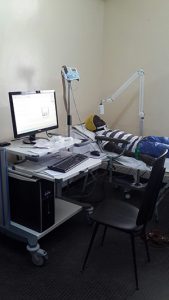
EEG room of the neurology department at Fann Teaching Hospital, Dakar, Senegal.
- Concerning research, the AFAN must offer research funding, support basic research in neurosciences, and help to create regional reference centers.
- For neurological health promotion, AFAN must help to develop standards and guidelines for:
- Stroke units
- Neurology emergency centers
- Clinical neurophysiology labs
- At last, the AFAN must encourage excellence by identifying and supporting young promising neurologists, offer clinical research fellowships, and create awards for galvanizing young researchers.
In sum, all this will be achievable only through the massive support of African neurologists in this initiative by networking. The initiation and the development of this project is vital for an integrated African neurology at the service of people and beaming worldwide.
References
- Diop AG, Gouider R. Neurology in Sub-Saharan Africa. World Neurology. 2014 Oct;29(5): 9
- Ndiaye MM, Charway-Felli A. The Establishment of the African Academy of Neurology. eNeurologicalSci 3 (2016) 15-16
